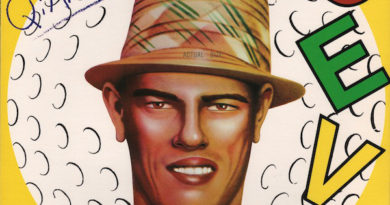Total Eclipse: Rediscovering Klaus Nomi
A new vinyl reissue of his singular debut has the world talking about the German-born, New York-based art pop pioneer and his avant cabaret

In 1972, Klaus Sperber left his native Germany for New York City. Within a few years, he’d reinvented himself as Klaus Nomi, an otherworldly being with a spookily high voice, equally at home with contemporary pop and classical opera, further dazzling his audiences with his austere makeup and futuristic outfits.
His national profile got a boost when a fellow man-who-fell-to-earth, David Bowie, picked him to be one of his backing singers on Bowie’s December 15, 1979 appearance on Saturday Night Live. A record deal followed. International stardom seemed only an aria away.
VIDEO: David Bowie – Klaus Nomi — The Man Who Sold the World – SNL 1979
Klaus Nomi, newly reissued on black and white “cabaret smoke” vinyl by Real Gone music, was first issued in 1981, and mixes together original material, twisted takes on cheesy pop and classic rock, and two heartbreakingly beautiful classical numbers. The black and white cover, with Nomi gazing imperiously down at his subjects, would’ve offered little clue as to what type of music would’ve lurked within.
Nomi’s own “Keys of Life” gives the album a regal, ethereal opening, as he solemnly intones, “From ancient worlds I come…” over a spare synthesizer backing, an emissary going on to warn us that time’s running out and the time for action is now. But then we tumble straight into a robotic remake of Lou Christie’s 1966 hit “Lighting Strikes.” Nomi’s clipped vocal delivery makes the song’s soppy lyrics (a man’s cloying plea that he be allowed to cheat on his girlfriend while he’s still single) into something hilarious. An eye-rolling line like “For the time being, baby, live by my rules!” becomes playfully subversive in Nomi’s hands (especially when he rolls the R’s on “r-r-r-rules!”).
VIDEO: Klaus Nomi — The Twist
But that’s nothing compared to the overhaul given to “The Twist.” Slowed down, it becomes a doom-laden chant, punctuated by occasional falsetto swoopings that eventually gather together, like a flock of birds preparing for flight, before devolving into cackling laughter. And there’s more fun to be had in his take on Leslie Gore’s proto-feminist “You Don’t Own Me,” as he spits out the lyrics with relish, before once again soaring to operatic heights during the fade out.
“The Nomi Song” is surprisingly upbeat and perky, considering that the lyrics are a wish for acceptance; it’s matched by the eerie “Nomi Chant,” in which synthesizers conjure up visions of a barren, desolate landscape, as ghostly voices flit by, whispering the name “Nomi….” Probably the best synthesis of Nomi’s musical stylings can be found in “Total Eclipse,” which has the stolid 4/4 beat of a marching song, another soaring vocal, and sounds like it’s the kind of anthem that welcomes home the troops after a glorious victory, when it’s really heralding the approaching apocalypse, Nomi looking forward to being vaporized with unabashed giddiness.
VIDEO: Klaus Nomi Interview + Total Eclipse on German TV
If you heard any of these songs in passing, you’d think that Nomi’s stratospheric vocals were a novelty, a gimmick. But the two classical pieces reveal how seriously he took his craft. The number credited as “Samson and Delilah” (from the 1877 opera of the same name), is more accurately known as “Mon cœur s’ouvre à ta voix” (“My heart opens itself to your voice”), and is a song of seduction. Nomi delivers a beautiful, breathtaking performance, that ends with an explosive eruption of sounds as if he’s being beamed back up to the mothership (in performance, he’d disappear into clouds of smoke at the end of the number).
Even more heartrending is his performance of “The Cold Song,” from the 1691 opera King Arthur or, The British Worthy. It’s sung by a winter spirit who’s been summoned from his slumber to spread frost over the world, who instead begs to be allowed to return to his eternal rest: “Let me, let me, freeze again to death.” Nomi sang this melancholy wish to return to the grave in one of his last performances, at a “Classic Rock Night” in Munich in 1982, ten years after he’d made his journey to the new world, where he’d metamorphosed into a startlingly unique creation. He would be dead, at the of 39, in less than a year from AIDS, then still known as the “gay cancer,” his friends too frightened of this new plague to visit him in the hospital.
Klaus Nomi stood at the intersection of high art and mass culture, an artist who seemed to look ahead more to the 21st century than he fit in in the 20th, and who could well have found the international acclaim he sought in our present day, when countertenors like Andreas Scholl and Philippe Jaroussky enjoy great success. His legacy is the spell that is still cast by the music he left behind, songs that delight and amaze as you watch the artist perform feats of daring do on the high wire, dancing among the stars without a net.




